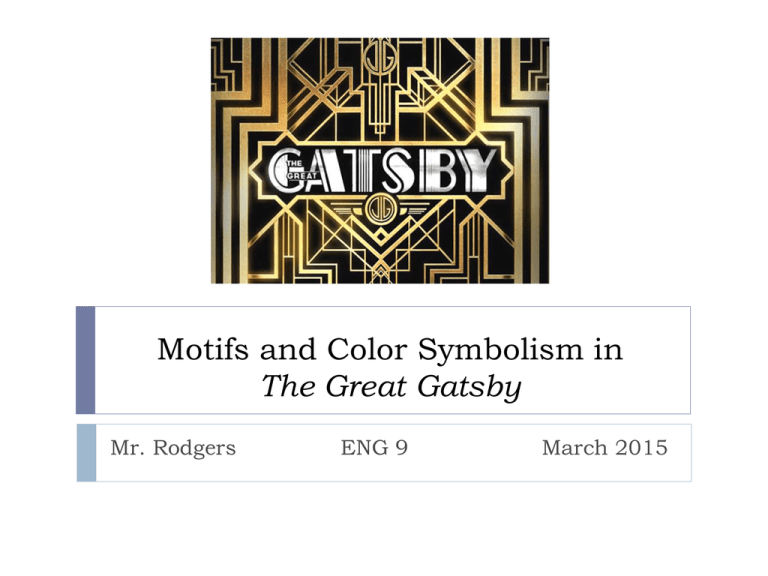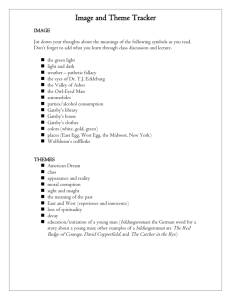Symbolism in the Great Gatsby
advertisement

Motifs and Color Symbolism in The Great Gatsby Mr. Rodgers ENG 9 March 2015 Fitzgerald in the midst of Modernism F. Scott Fitzgerald is considered a key player amongst the writers and artists of the modernist movement. Modernism emerged after WWI and was used to capture and depict the contradictions and complexities of life. Modernism (cont.) Modernist art often reflected the feelings of its creators; the writing or art showed a feeling of disconnect and cultural crisis from the traditions of the past. Modernist art usually deals with some feelings or concept of isolation or separation from society. This resulted in many writers and artists doing things in an unconventional way, or “breaking tradition.” Fitzgerald and many others left America to work in Paris. Within Gatsby, the narration is isolated (only Nick’s perspective), and Gatsby is often seen as isolated. Fitzgerald used many extended metaphors, color associations, and symbolism to add depth to his message. Motifs In general, a motif is “a distinctive feature or dominant idea in an artistic or literary composition.” Motifs repeat, and can be musical, but we have been focusing on recurring symbols. Motifs already discussed from Gatsby: the green light, the eyes of Dr. T.J. Eckelburg (to be discussed later) Remember, modernists heavy use of symbols also applied to characters, not just objects. Repetition of symbolic characters would also make them motifs, in essence. Gatsby as a Symbolic Character James Gatz is a fully realized character if you consider his back story and what drove him to become Gatsby. However, Gatsby himself is symbolic in his consistency. He is a representation of opulence, infinite wealth, and a zeal for what he wants without compromise. What about the “Owl-Eyed Man”? Owls have, over time, represented different things: Most commonly, they represent wisdom and knowledge. A more outdated idea, but one that Fitzgerald was probably familiar with, was the owl as a harbinger of death. Owl-eyes may also simply represent a very observant person who sees things as they are. “Owl-Eyed Man” (cont.) Owl-eyes may also simply represent a very observant person who sees things as they are. For this one, as well as wisdom, consider our first glimpse of the owl-eyed man. Even in his drunken state, he could see how much of a production Gatsby was putting on by examining the library, and was very impressed. A more outdated idea, but one that Fitzgerald was probably familiar with, was the owl as a harbinger of death. At the end of that party, where do we see this man? He was stumbling out of a car that lost it’s wheel. The Eyes of T.J. Eckleburg An eerie old billboard from an optometrist is referenced a few times in the story. As a greater symbol, it represents that many of the characters, while perhaps doing illicit things, are always being watched, even if it is without consequence. This way, T.J. Eckleburg may represent the eyes of God. Color Associations: White White is often used in The Great Gatsby to portray a sense of purity---even if it is to cover up corruption. Jordan and Daisy are often seen in white, and we are introduced to them this way. Gatsby chooses to wear white when he reunites with Daisy at Nick’s. Gatsby’s white steps have an obscene word scrawled on them at the end of the book, which Nick erases. Color Associations: Gold/Yellow Gold or Yellow (fake gold) can be seen to represent abundant wealth or riches, but once again can be a distraction to what is truly underneath. Jordan and Daisy are described as “golden girls,” and Jordan is physically described as golden by Nick at times. Turkey at Gatsby’s parties are “bewitched to a dark gold.” Yellow is the color of Gatsby’s car, which kills Myrtle (rich destroying poor, carelessness). Color Associations: Red Red can be seen as a color of passion, violence, or aggression. Much of the red in this story is linked to Tom Buchanan---the interior of his house, the blood he sheds when he hits Myrtle, etc. Gatsby’s blood in his pool after being shot is another example. Color Association: Grey Grey is used in a contrast to the glittering gold and silver of the rich. George and Myrtle Wilson live in the “Valley of Ashes”---characters and a place seen in grey. Myrtle only gains colorful descriptions when she is with Tom. Green and “The Green Light” Green can mean many things, and can represent money or envy, but in the case of this book, it often represents reminiscing about the past, or hope. We first see Gatsby longing for the green light, which we later find is on Daisy’s dock. Nick, caught up in Gatsby’s gift for hope, says that the green light “eluded us,” but “tomorrow we will run faster, stretch our arms out further…”



